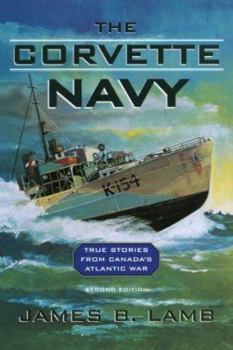The Corvette Navy: True Stories from Canada's Atlantic War
Select Format
Select Condition 
Book Overview
James B. Lamb joined the Royal Canadian Navy in 1939 and spent World War II on several corvettes. He is the author of several books including Alexander Graham Bell, Baddeck's Gentle Genius, and On the... This description may be from another edition of this product.
Format:Paperback
Language:English
ISBN:0773761276
ISBN13:9780773761278
Release Date:January 2000
Publisher:Stoddart
Length:224 Pages
Weight:0.82 lbs.
Dimensions:0.7" x 6.0" x 9.0"
Customer Reviews
2 ratings
A fascinating look into WWII convoy duty
Published by Thriftbooks.com User , 23 years ago
I was thrilled to discover this book has been re-released, as it has been unavailable for years. Another reviewer has gone into great detail, and I do not want to repeat what he has written. However, I will reinforce his review with my own endorsement - this book is a fascinating look at the every day lives of men in the naval service. Little more than boys, really, thrown in over their heads to either sink or swim. However, the stories contained in this book are often humourous, as "boys will be boys" stories. The humour is intermingled with some interesting insight into the feel of the RCN in WWII - for example, their awe at being in the presence of a British battleship. Highly recommended for anyone interested in this era.
The kids who stopped the U-Boats
Published by Thriftbooks.com User , 24 years ago
In every war, a few men gain an everlasting reputation by standing brave and firm against immense odds -- from the time of the Spartans at Thermopylea to the US Marines at Khe Sahn -- and the story of the men who manned the corvettes of the Royal Canadian Navy is one such legend. James B. Lamb was one of those men, and he has written a superb story about `The Corvette Navy' of Canada which helped fight the U-boats to a stand-still in World War II. Corvettes were rugged little ships, about 200 feet in length and only 1,200 tons, based on the design of Antarctic whaling ships. Almost 300 were built, the largest number of any one class of warships ever built. England's Royal Navy named them for flowers; which meant the proud Teutonic U104 was sunk by HMS Rhododendron, and U147 was sunk by HMS Periwinkle, and U605 was captured by HMS Poppy. It was truly "flower power" in action. Canadians named their corvettes after towns, and let crews design the coat-of-arms for each ship. Five aces were chosen for HMCS Baddeck (bad deck -- get it?); a crowned lady falling on her backside in a puddle of water became the crest for HMCS Wetaskiwin (Wet-ass-Queen). Lamb, one of the top newspaper editors in Canada during his career, includes the courage, duty, sacrifice, terror and, thankfully -- the humor that war can provide. Lamb lived that experience, as commander of HMCS Minas and later HMCS Camrose. His book is a first hand account. The winter North Atlantic, where Canadian corvettes took convoys to and from England, is one of the grimmest bodies of water on earth. Fall into the sea, and you lose consciousness within five minutes and freeze to death within 15 minutes. Lamb tells of frantic work by corvette crews to chop foot thick ice of the upper decks to keep from rolling over and sinking. He also tells of a depth charge attack against a U-boat by a trawler which couldn't get away from the explosions in time. Geysers of water erupted and the trawler disappeared under the spray; when it reappeared with it's stern blown off and steam pouring from broken boiler pipes, the captain meekly signaled, "I have busted myself." Even Americans, who got into the war two and one-quarter years after Canada, are included. Lamb was once part of a crew bringing a new Canadian warship from British Columbia to the North Atlantic. The Americans posted an armed guard with a massive gun on his hip to prevent any "monkey business" while in the Panama Canal. Canadian ships in those days issued a daily tot of rum to every sailor; so the guard was plied with food and extra rum. After he fell asleep in his chair, the Canadian sailors slipped the revolver out of the man's holster and replaced it with a banana. When the fun was over, they gave a very worried guard his beloved gun back before they left him in Colon, Panama. In a few months, the Canadians were in the toughest combat theatre of World War II; the American was left




